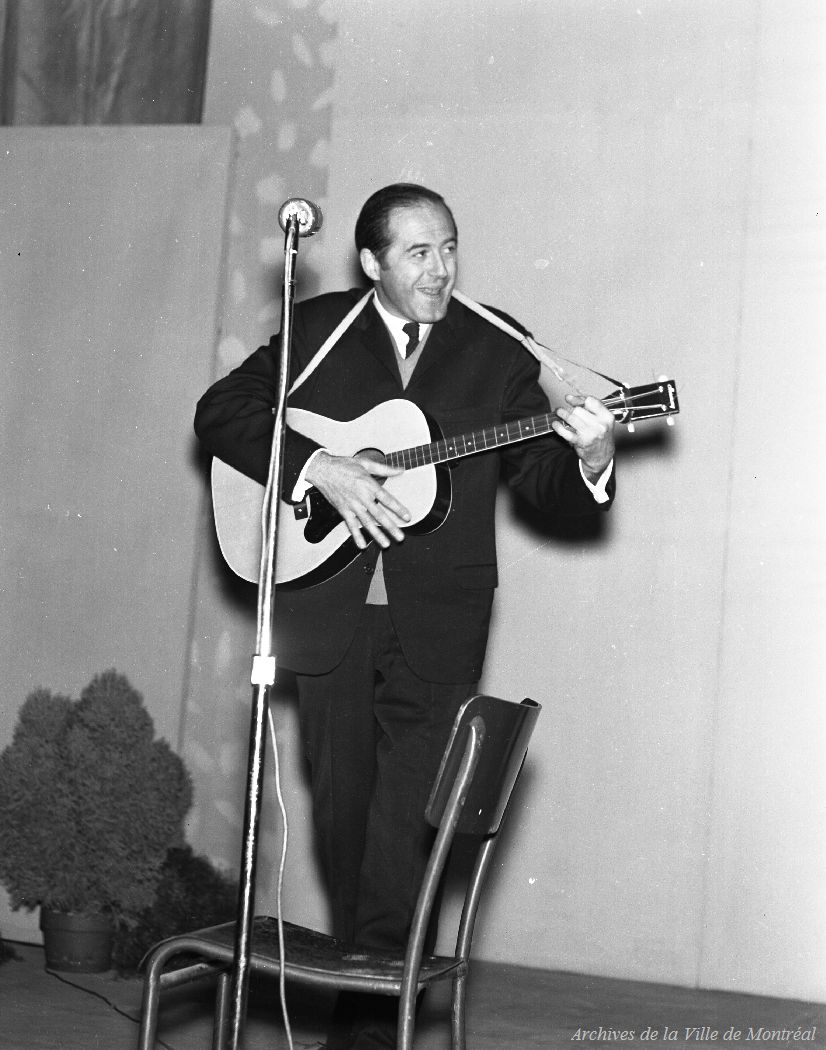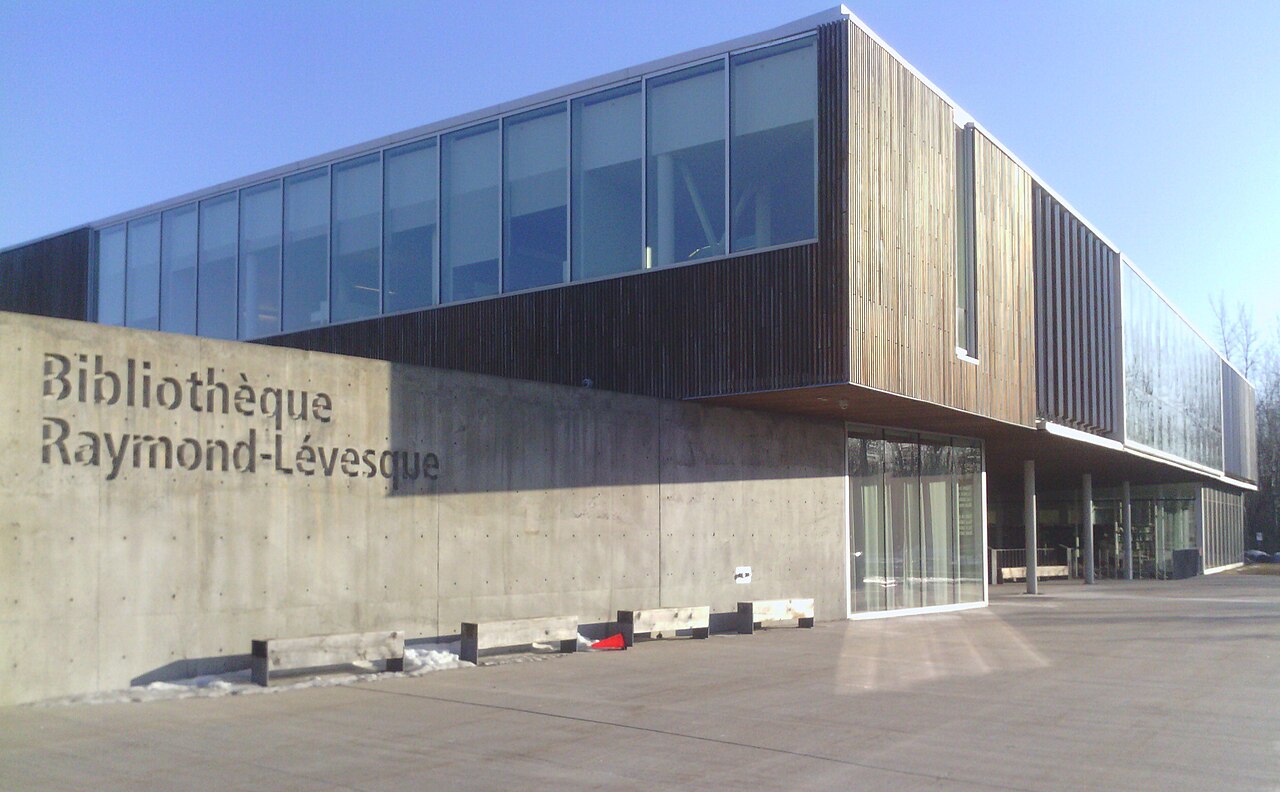Raymond Lévesque, singer-songwriter, radio host, poet, writer, actor (born 7 October 1928 in Montreal, QC; died 15 February 2021 in Montreal). Raymond Lévesque was a true chansonnier of the Parisian-inspired style that combined song, comedy and political satire in his revues. Lévesque never really achieved stardom himself, but he paved the way for the dynamic wave of Quebec chansonniers during the 1960s. "Quand les hommes vivront d'amour", "Les trottoirs" and "Bozo-les-culottes" remain his best-known songs. Lévesque was made Officier of the National Order of Quebec in 1997.

Early Years
Raymond Lévesque was born to copywriter Albert Lévesque and Jeanne Labrecque. His mother Jeanne passed away from cerebral thrombosis when Raymond is only four years old. After he dropped out of school at age 14, his grandmother taught him to play the piano.
Raymond Lévesque studied piano with Rodolphe Mathieu and drama with Madame Jean-Louis Audet (Yvonne Duckett). Inspired by the works of French sensation Charles Trenet, Lévesque began composing songs in 1943, at the age of 15.
Radio Debut
In 1947 Raymond Lévesque came to the attention of Fernand Robidoux, who invited him to appear on his CKAC (Montreal) radio program and performed some of his compositions. Lévesque was co-host of the CBC radio program “Grand'maman Marie” (1949–51) and later was a singer and host in programs on CKAC and CHLP. After serving as host for the CBC TV variety series “Mes Jeunes Années” with Colette Bonheur (1952–54), he left for Paris.
The Paris Years
During the 1950s Raymond Lévesque spent five years in Paris where he sang on radio and in cabarets in Montmartre and on the Left Bank. He recorded four singles for Barclay, touring France with the entertainer Annie Cordy and befriending Georges Brassens, Raymond Devos and Juliette Gréco. Eddy Constantine recorded his song “Les Trottoirs” in 1954, while Bourvil popularized his “La Vénus à Mimile.”
In 1956 Lévesque wrote his greatest success, “Quand les hommes vivront d'amour,” one of the first "classics" of the Québécois chanson. It has since been performed and recorded numerous times by prominent artists in France and in Quebec, such as Bruno Pelletier. Among his other songs are "Le Coeur du Bon Dieu" and "Rosemont sous la pluie."

Musical Career in Montreal
Raymond Lévesque returned to Montreal in 1959 and cofounded the group Les Bozos with other chansonniers. He also became actively involved in the Quebec separatist movement.
While working in a succession of his own cabarets (Le Bar du Music-Hall, Le Parlement, L'Évêché), he staged some 40 revues (theatrical acts that combine song, comedy and political satire) (summers 1961–74) at the Butte à Mathieu in Val-David, north of Montreal. A true chansonnier of the Parisian type, Lévesque also staged several revues during the 1970s and 1980s: Tharèse (1974), On veut savoir (1980), C'est à ton tour mon cher René (1983), Waitress (1986), Deux mille ans après Jésus-Christ (1988), etc.
Lévesque was a featured performer in many variety shows in Montreal (at Expo 67, Comédie-Canadienne, Le Patriote, PDA) and Quebec City (La Résille, Grand Théâtre). He was a guest on many TV programs, sang in various clubs, acted on stage – often appearing in the plays of Marcel Dubé – until the mid-1980s, when he became afflicted with deafness and chose to focus on writing.
Publications
Following the success of “Quand les hommes vivront d'amour” (1968), Raymond Lévesque published around fifteen books as well as many collections of poetry in Montreal: Au fond du chaos (1971), Le Malheur a pas des bons yeux (1971), On veut rien savoir (1974), Le Temps de parler (1977), Électrochoc (1981) and Quand les hommes vivront d'amour II (1989).
He also published one play, Bigaouette (1970), as well as his memoirs, Raymond Lévesque, d'ailleurs et d'ici (1986), and a collection of songs titled Le P'tit Québec de mon coeur (1990).

Honours
Raymond Lévesque remained as Claude Gingras once described him in La Presse (Montreal 19 February 1968): “a genuine artist, who has something to say, who has wit, who can find just the right words, and who knows how to write a song.” Through his poems, his monologues, and such songs as “Le Coeur du Bon Dieu,” “Rosemont sous la pluie,” and “Bozo-les-culottes,” he has slowly drawn away from the influence of French singer Charles Trenet. His compositions, at one time so sentimental, have become more and more humorous, incisive, and socially committed.
Raymond Lévesque received the Félix Award “Témoignage de l'ADISQ” in 1980, and another Félix in 1999 for a collection of his works. The Prix CIEL-Raymond Lévesque created in his honour in 1986 was notably awarded to Jim Corcoran, Marie Philippe and Luc de Larochellière. Pauline Julien and Fernand Robidoux have both dedicated records to him. He received the Jacques-Blanchet medal in 1996 and the Prix Denise-Pelletier in 1997 for his contribution to literature. He was made Chevalier of the National Order of Quebec (1997) and the National Film Board (NFB) filmed a documentary about him in 1998.
On 7 February 2011, the Bibliothèque Raymond-Lévesque was inaugurated in Longueuil, Quebec, a city where Lévesque lived for over 30 years.
(See also Chansonniers.)
A version of this entry originally appeared in the Encyclopedia of Music in Canada.
Discography
- Chansons et monologues (1962)
- À la Butte à Mathieu (1965)
- Après 20 ans (1967)
- Raymond Lévesque (1971)
- L'Automne Show (1974)
- Raymond Lévesque chante les travailleurs (1975)
- Le P'tit Québec de mon coeur (1977)
- Collection souvenir (1980)

 Share on Facebook
Share on Facebook Share on X
Share on X Share by Email
Share by Email Share on Google Classroom
Share on Google Classroom

